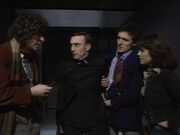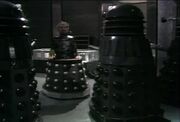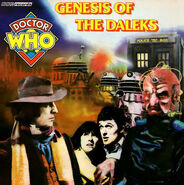Genesis of the Daleks was the fourth story of Season 12 of Doctor Who. It introduced Davros, creator of the Daleks, and showed the story of their origins. Davros would later serve a prominent role in every following Dalek serial up to Remembrance of the Daleks in 1988.
Genesis of the Daleks is also notable for being the only time in the classic television series where the TARDIS does not appear whatsoever for two consecutive serials.
Also notable is the fact that this is one of the only two Dalek serials in all seven years of Tom Baker's run on the show, the other being 1979's Destiny of the Daleks. This became the start of a practice throughout the classic series where most recurring enemies would see a significant reduction in the amount of encounters between them and the Doctor; the Daleks, to name an example, would only star in one televised serial during each succeeding Doctor's tenure for the remainder of the 1963-1989 run.
In a 1998 poll conducted by Doctor Who Magazine, Genesis of the Daleks was praised by fans as their favourite Doctor Who story of all time. (DWM 265)
Synopsis
Intercepted while travelling between Earth and the Ark, the Fourth Doctor and his companions are transported to the planet Skaro, thousands of years in the past, on a mission for the Time Lords — to prevent the creation of the Daleks.
Plot
Part one
On a foggy battlefield, men with painted gas masks and armed with archaic rifles advance out of a trench and are brutally cut down by machine gun fire. The enemy squad marches over their bodies.
The Fourth Doctor walks through the cold mist, wondering why he's not on Nerva. Suddenly, another Time Lord appears in front of him. The Doctor realises that they intercepted the transmat beam he and his companions were riding to Nerva. The Doctor is angry that the Time Lords are still interfering in his life, however the Time Lord explains that for the freedom they allow him they will occasionally ask for something in return. The Doctor refuses until he is told his mission involves the Daleks. The Time Lord tells the Doctor that they have foreseen that the Daleks will eventually exterminate all other life in the universe unless they're stopped. They want the Doctor to travel back to the time of their beginning to avert their creation, make them less aggressive, or find some inherent weakness in their makeup. The Doctor agrees, and asks for the coordinates for Skaro, the Dalek homeworld. The Time Lord tells the Doctor that he is already there, and vanishes after giving him a Time Ring that will return him to the TARDIS when his mission is complete.
Harry Sullivan and Sarah Jane Smith find the Doctor. As they explore the battlefield, they come across bodies equipped with a curious mix of ancient and modern equipment. The Doctor theorises that the war has been going on for a long time, perhaps a thousand years, with technology regressing as resources get more scarce.
In the distance, they see yet another sight — a protective dome large enough to cover an entire city. The trio cross the lines into another trench, where the bodies of the fallen have been propped up to make the place appear more heavily guarded. Suddenly, gas shells drop as a squad of soldiers attacks. Another door bursts open and black-uniformed soldiers emerge, counterattacking with submachine guns. Having dealt with the enemy, they drag Harry and the Doctor into their bunker, leaving an unconscious Sarah behind among the dead.
The soldiers, all very young men, take the Doctor and Harry to see General Ravon, who is in his early twenties. These are the Kaleds, who are fighting a war with the Thals for dominance of Skaro. Soon, Ravon boasts, they will exterminate the Thals from the face of Skaro. The Doctor notices that "Kaled" is an anagram of something familiar.
The Doctor and Harry manage to disarm Ravon, forcing him at gunpoint to take them back to the surface. However, they encounter Security Commander Nyder, who becomes suspicious and orders his men to open fire. Releasing Ravon, Harry and the Doctor run for and reach the surface, but are soon captured by the Kaleds once more. Ravon thinks the two are Mutos, the descendants of those mutated by chemical weapons in the first century of the war and cast out into the wastelands to maintain Kaled racial purity. The Doctor tells Nyder they are aliens, but Nyder is sceptical, since the Kaleds' greatest scientist, Davros, has said there is no life on other planets. Nyder takes custody of the Doctor and Harry for interrogation.
Sarah has regained consciousness and, unable to enter the bunker, walks into the wastelands, where she is being followed by Mutos. She stumbles across a crumbling structure, and peeps through to see an old and crippled man — referred to as Davros — his lower body enclosed in what appears to be a sophisticated mobile chair that resembles the bottom half of a Dalek. The wizened, hairless figure has a withered left arm, and his eyes are both closed over, with a third, electronic eye on his forehead blinking as he speaks. His assistant, Gharman, sets up several man-shaped targets, and Davros flicks a switch on his chair. To Sarah's horror, a Dalek is revealed in a dim glow of light. Davros gives it some simple commands in a grating, half-synthesised voice... "Exterminate!" The Dalek fires its deadly laser weapon, obliterating the targets. Davros is pleased. "Now we can begin..."
Part two
After Gharman and Davros lead the Dalek away, Sarah is taken prisoner by the Mutos. In the Kaled bunker, Nyder orders that the Doctor and Harry be scanned. The scan detects the Time Ring, which is confiscated despite the Doctor's protests. It is placed with their other belongings as they are taken to Senior Researcher Ronson for questioning.
Two Mutos argue over Sarah's unconscious body. Gerrill notes that she is a "Norm", and Norms are to be killed by Muto law. Sevrin, however, questions why the Mutos should always destroy beauty. The fight is interrupted by a squad of Thal soldiers, who shoot Gerill, but take Sevrin and Sarah to the Thal Dome as slave labourers.
Ronson, a member of the Scientific Division, examines the results of the scan, and is startled to discover that the Doctor and Harry are indeed aliens. Before he can question them further, an alarm rings; Davros is arriving, bringing with him his "Mark III travel machine", which the Doctor identifies to Ronson as a Dalek. When Davros releases the primitive Dalek to independent control, it swivels around and pauses at the Doctor and Harry, detecting their non-Kaled physiology. It cries out that they are aliens and must be exterminated, but Ronson switches the Dalek off before it can fire.
Davros is furious that Ronson interceded when his creation showed a natural instinct to destroy. Ronson pleads with Davros that the prisoners might hold valuable information, and Davros relents. They will be used when the demonstration resumes, at first light, but Ronson may question them until then. The two are taken to the cells.
In the Thal Dome, Sarah discovers that the Thals have placed all their remaining resources into a rocket that they hope will bring them victory in one decisive strike. The slaves are being used to pack the rocket's nose cone with distronic explosives. To reduce the weight, no shielding is provided, which means the slaves will get distronic toxaemia and die after a few hours' exposure.
The Doctor has learned that the bunker they are in is a few miles away from the Kaled dome. Years ago, the Kaled government decided to form a scientific elite for research, but over time the elite became more and more influential. Ronson tells them that Davros has just announced that the Mark III travel machine will now be known as a Dalek, and Ronson asks how the Doctor knew this in advance.
When the Doctor reveals that he is a time traveller, Ronson confides in him that he and a few others believe the direction of Davros' research has turned immoral and evil. The elite discovered that their race was already mutating. Davros believed that this mutation could not be reversed, and began experiments to determine the Kaleds' final mutated form, developing these "ultimate creatures" which he will put in travel machines. Ronson believes that if the government were told about the experiments they would shut Davros down, but he is unable to get out of the bunker. The Doctor offers to contact the right men if Ronson helps them escape.
The first load over, Sarah and the other slaves return to their cell, exhausted. She tells them they must act before they are too weak from distronic exposure to do anything. She proposes they try to escape through the dome's exit at the top of the rocket. Overpowering their guard, the slaves rush out to the silo and start climbing, as Thal troops fire up at them. But Sarah gets into difficulties and Sevrin urges her on. Suddenly she loses her grip and falls, screaming...
Part three
Several are shot, falling to their deaths. Sarah and Sevrin make it to the nose cone of the rocket but are caught before they can escape. Meanwhile, Ronson has helped Harry and the Doctor escape, and they make their way to the Kaled dome. Back in the bunker, Davros orders further improvements to the Dalek shell's systems.
Another scientist, Kavell, tells Ronson that the Doctor and Harry have made contact with the Kaled leadership in the dome. There, the Doctor briefs the Kaled Councillors, including one named Mogran, on future events and how the name of the Daleks will terrorise the universe for generations to come.
Nyder tells Davros that his spies have reported that a secret meeting between Mogran and some Councillors that oppose their work occurred in the dome with the two prisoners present. Davros tells Nyder to find out how they escaped and the details of the meeting; he will deal with Ronson in his own way. Mogran and his Councillors have decided that an independent inquiry will look into Davros's experiments, and until then, all work at the bunker will cease. If the Doctor's allegations are borne out, the project will be shut down. When they leave to tell Davros their decision, Ravon tells Harry and the Doctor that Kaled agents in the Thal dome have reported that a girl led an attempted breakout. The Kaleds know about the rocket but are unconcerned because Davros has reinforced their dome. Ravon agrees to show the Doctor and Harry how to get to the Thal dome.
Davros seems to take Mogran's announcement of the inquiry well, but after they leave, he orders twenty mutants to be placed within the Dalek shells. Nyder protests that they are still unstable, but Davros replies that he will place them under a degree of computer control. He and Nyder are going on a journey...
Harry and the Doctor reach the Thal dome, and while making their way through the corridors manage to spy on a meeting between some Thals and Davros, with Nyder by his side. The Kaled chief scientist tells the Thals that he is only interested in peace. He adds that the Kaled dome is currently impenetrable, but gives them a chemical formula that will weaken the dome enough for the rocket to work. All he asks is that he be allowed to help in the reconstruction of Skaro when the war is over.
Harry and the Doctor continue their search for Sarah. They overpower two guards and steal their radiation suits. Entering the silo, they take care of the guard there and free the slaves. Harry, Sarah and Sevrin leave for the Kaled dome to warn them and advise an immediate offensive while the Doctor attempts to sabotage the rocket. However, before he can do so, the guard in the silo revives and activates an electric grid, sending an electric surge through the Doctor's body, shocking him into unconsciousness.
Part four
The Doctor awakens in the control room of the Thal dome, where a screen shows the Thal chemical bombardment of the Kaled dome. The Thal leader gives the order to start the rocket countdown. In the bunker, the Kaled scientists watch the bombardment with disbelief; who could have given the Thals the right formula?
The Thal rocket fires, and blows up the Kaled dome. The Doctor ruefully observes that he sent Harry and Sarah in there. In the bunker, Davros vows "revenge" beginning with the "Thal spy" Ronson. With an order of "Exterminate!" from Davros, Ronson is shot down by the Daleks. Davros declares the death of the Kaled race and the rise of the Daleks as the supreme being and ultimate conqueror of the universe.
The Thal leader is jubilant that the war has ended, and orders all prisoners to be freed, including the Doctor. The Doctor, however, is melancholy. A Thal woman, Bettan, asks him if he had friends in the dome and the Doctor replies yes. However, he intends to continue to try to stop the development of Davros's Daleks. Bettan says that Davros is a hero, despite the Doctor telling her that he only betrayed his people because they were about to stop his experiments.
In the bunker, Davros tells Gharman to implement new variations to the Dalek mutants' genetic structure. Gharman notices that this will produce mental defects, making them devoid of conscience, morality or pity. Davros calls them "improvements" and orders Gharman to carry out his orders without question, but Gharman is obviously disturbed by this development.
Under Davros's orders, Daleks enter the Thal dome and begin exterminating people. Bettan runs into the Doctor, and the two flee the dome. The Doctor tells her that she has to form what Thal survivors there are into a fighting force and destroy the Kaled bunker.
As the Doctor makes his way back to the bunker to retrieve the Time Ring, he is attacked by Mutos. However, he is saved by Harry, Sevrin and Sarah, who did not manage to reach the dome before it was destroyed. Before they return to the bunker, the Doctor asks Sevrin to join Bettan and help her organise the survivors.
In the bunker, Gharman quietly tries to convince Kavell that they have to stop the Daleks. However, they are overheard by Nyder. The Security Commander approaches Gharman and convinces him that he believes Davros has become a megalomaniac and has to be stopped. He arranges to meet Gharman in the detention rooms on the lower level where Davros never goes. There, Gharman gives Nyder the names of those who oppose Davros, which is all that he really wanted. Davros appears, and Nyder knocks Gharman unconscious. At that moment, Sarah, Harry and the Doctor emerge from the ventilation shaft right in front of the two, and are captured.
Davros interrogates the Doctor, who tells him why he is here. Davros asks him if the Daleks always win in the future, and the Doctor tells him that they have occasionally been defeated. Davros demands to know what mistakes the Daleks make, intending to correct them, but the Doctor refuses. Davros hooks Sarah and Harry up to his machines, and tells the Doctor that if he lies or does not answer his questions, his friends will suffer.
Part five
As Davros increases the power of the torture devices, the Doctor reluctantly answers Davros's questions. Over the course of the next few hours, he gives a litany of the Daleks' defeats and why they were defeated. The first session over, Sarah and Harry are taken to the detention area. Davros wants to speak to the Doctor, scientist to scientist.
The Doctor pleads with Davros to stop the development of the Daleks. The machines are not the problem — the evil creatures inside them are. Davros says that they are merely conditioned to survive, and to do so, they must become the dominant species. When all other life is suppressed, there will be universal peace.
The Doctor asks Davros a hypothetical question: if he had invented a virus that would destroy all other forms of life on contact, would he use it? Davros considers the question and observes that the power to make that choice would elevate him above the gods, and yes, he would do it. Convinced now that Davros is mad, the Doctor seizes his arm and threatens to turn off his life support chair unless he orders the Dalek mutants destroyed. However, Nyder enters and knocks the Doctor out before Davros can give the final order.
Nyder takes the Doctor back to the cells, but in the meantime, Kavell has managed to knock out a guard and free Sarah, Harry and Gharman. Harry, dressed as a guard, tries to stop Nyder, but he gets away. Gharman and Kavell go to organise the others against Davros, but the Doctor warns them to be careful: Davros knows what they are planning. The time travellers now have two things to retrieve: the Time Ring and the tape recording with knowledge of the future.
The Daleks in the Thal dome eliminate the last of the Thals still inside and are ordered back to the bunker. Sevrin tells Bettan that there are no more survivors except those who managed to escape the city. In the bunker, fighting breaks out between Gharman's and Davros's supporters, with Gharman's side gaining the upper hand. To Nyder's surprise, Davros orders him to surrender. Gharman and the rebels meet Davros and deliver their ultimatum: to destroy the Daleks and cease work on the project. Davros agrees, but he wants a meeting of both the military and scientific elite in an hour and a vote to be taken on the issue.
Searching through the lockers, the Doctor finds a chunk of plastic explosive and detonators. There is one option left to him to stop the Daleks: genocide. He enters the incubator room to set up the explosives, intending to destroy the Daleks forever. As Sarah and Harry wait, the Doctor staggers out, with several embryonic Dalek mutants wrapped around his throat, strangling him.
Part six
With Harry and Sarah's help, the Doctor manages to free himself and throw the mutants back into the room. All he has to do is touch two wires together and the Daleks are destroyed. However, the Doctor hesitates; does he have the right to commit genocide? He tells Sarah that many future worlds became allies because of their fear of the Daleks. If he wipes the Daleks out, he becomes no better than they are.
Gharman approaches and tells them that Davros has agreed to the ultimatum, and the Doctor is grateful for not having to make the final decision. He disconnects the wires, and they go to the meeting. There, as Davros makes his case, the trio secretly pocket the Doctor's belongings that were confiscated earlier, including the Time Ring. Gharman proposes an alternative: to let the Daleks continue, not as Davros's genetically ruthless creatures, but with human strengths, weaknesses and emotions.
Meanwhile, the Daleks re-enter the bunker. Bettan's rebels follow them in unseen, and set up explosive charges to collapse the bunker and entomb the Daleks forever. She cannot afford to delay, and Sevrin goes deeper into the bunker to try to warn the Doctor and the others.

The Doctor, Harry and Sarah capture Nyder.
As the vote takes place, Nyder casually walks off. Suspicious, the TARDIS crew follow him, and head him off in the hallway. They grapple with him, and the Doctor unknowingly drops the Time Ring in the corridor because of the struggle. The Doctor forces Nyder to bring them to where the tape recording is kept, After Nyder tries to play innocent, the Doctor singles him out as the only one who can open the safe in Davros's office because Davros cannot do so with his handicaps and needs an assistant, and Nyder begrudgingly fetches the recording. The Doctor destroys the recording with a Dalek gun, but while the group's attention is turned away from him, Nyder gets away again, locking them in the room. The Doctor attempts to use the Time Ring to escape, but then finds out he has dropped it. With the Time Ring gone, they can only watch on the monitor as Gharman and his rebels continue their confrontation with Davros.
Davros offers to destroy the Daleks through a large red destruct button in the room, but only after all those present vote on it. He blackmails Kravos into siding with him over the fact he saved the Kaled's life by mending his heart with an instrument that would keep it beating, but Kravos's true loyalties still lie with the other scientists. Once those who are against Davros and the Daleks have identified themselves, Davros orders the Daleks to exterminate them. Gharman and the scientists are murdered en masse, and at the sight of this massacre, Kravos tries to intervene and is killed as well.
Sevrin opens the door where the Doctor and companions were trapped, and warns them about the Thal explosives. Mere moments after he leaves Davros's office, the Doctor finds the Time Ring in the hallway outside, and sends his friends with it to the main entrance, while he returns to the incubator room to finish what he started, urging them to escape against their wishes to stick by his side. The Doctor is unable to connect the wires there due to a Dalek arriving and firing at him, but when the Dalek glides forward, its metal body forms a circuit with the wires and the incubator room explodes, taking the Dalek with it.
Davros suddenly notices that the Dalek automated assembly line has started, although he gave no such order. One of the Daleks says it gave the order, and refuses when Davros tells it to shut the line down. Davros orders Nyder to stop the line, but midway in his flighty dash to the controls, the Daleks exterminate him, and Nyder's body slumps to the floor. The Daleks state production will continue.

The Daleks refuse to acknowledge Davros as their superior.
The Doctor runs towards the main entrance, a squad of Daleks in pursuit, just as Bettan is about to give the order to detonate the charges. He makes it through the doors as they go off, sealing the bunker. Inside, the Daleks tell Davros that their programming does not allow them to acknowledge any creature as their superior. Davros argues they cannot survive without him and his guidance, but the Daleks reason they can maintain themselves under their own power and have the ability to think of new ways to survive without any outside help. Deeming anything inferior as their enemy, they prepare to destroy him and his Kaled supporters. The crippled scientist pleads with the Daleks to spare the scientists because they can help them and begs them to have pity, but that word is not in the Daleks' vocabulary. The Daleks immediately kill off the Kaled scientists, leaving Davros the last of his kind.
Davros then screams and tells the Daleks that they must and will obey him. The Daleks tell him they obey no one. Davros decides to destroy the Daleks by activating the red button, struggling to reach it from his chariot, but the Daleks see what he is doing, and they exterminate him. The lead Dalek proclaims that, despite their entombment, this is only the beginning. The Daleks will prepare and grow stronger and, when the time is right, they will emerge and become the supreme power in the universe.
The Doctor acknowledges that even with the incubator room gone, he has only managed to hold back the Daleks' progress by a thousand years or so. As the Thal resistance exits the bunker, the travellers say their good-byes to Bettan, Sevrin and the others, and prepare to use the Time Ring. Sarah asks the Doctor why he does not seem disappointed that he failed; as they are whisked away through time and space, the Doctor tells Sarah that although the Daleks will create havoc and destruction for millions of years, he knows that out of their evil must come something good...
Cast
- Doctor Who - Tom Baker
- Sarah Jane Smith - Elisabeth Sladen
- Harry Sullivan - Ian Marter
- Davros – Michael Wisher
- Nyder – Peter Miles
- Gharman - Dennis Chinnery
- Ravon - Guy Siner
- Time Lord - John Franklyn-Robbins
- Kaled Leader - Richard Reeves
- Dalek Operators - John Scott Martin, Cy Town, Keith Ashley
- Sevrin - Stephen Yardley
- Ronson - James Garbutt
- Tane - Drew Wood
- Gerrill - Jeremy Chandler
- Thal Soldier - Pat Gorman
- Kavell - Tom Georgeson
- Mogran - Ivor Roberts
- Thal Politician - Michael Lynch
- Thal Soldier - Hilary Minster
- Thal Guard - Max Faulkner
- Dalek Voices - Roy Skelton
- Bettan - Harriet Philpin
- Kaled Guard - Peter Mantle
- Kravos - Andrew Johns
- Thal Soldier - John Gleeson
Crew
- Writer - Terry Nation
- Studio Lighting - Duncan Brown
- Assistant Floor Manager - Karilyn Collier
- Film Cameraman - Elmer Cossey
- Production Assistant - Rosemary Crowson
- Visual Effects - Peter Day
- Davros Mask - John Friedlander
- Production Unit Manager - George Gallaccio
- Title Music - Ron Grainer and the BBC Radiophonic Workshop
- Theme Arrangement - Delia Derbyshire
- Make-Up - Sylvia James
- Costumes - Barbara Kidd
- Studio Sound - Tony Millier
- Special Sounds - Dick Mills
- Incidental Music - Dudley Simpson
- Designer - David Spode
- Film Editor - Larry Toft
- Film Sound - Bill Meekums
- Script Editor - Robert Holmes
- Director - David Maloney
- Producer - Philip Hinchcliffe
References
Cultural references to real world
- While treading carefully through the minefields of Skaro, Sarah Jane Smith mentions "Good King Wenceslas".
- The Doctor mocks General Ravon by calling him Alexander the Great.
Daleks
- Mark III Travel Machine is the name given to the first Dalek.
- Davros uses an agony seat to get information from the Doctor and his companions.
The Doctor's items
- In addition to his sonic screwdriver, the Doctor has, in his pocket, an etheric beam locator. He also carries a piece of Trisilicate from the mines of Peladon.
Individuals
Skaro
- The Doctor's first visit to Skaro is said to occur some 500 years after a war between the Thals and the Daleks.
Skarosian species
- The Kaleds and the Thals have had a Thousand Year War.
- The Mutos are those of the Kaled and the Thals who have been mutated by the chemical warfare on Skaro.
- The combatants make use of gas masks, radiation detectors and land mines.
- The Thals use distronic explosives in their rocket.
- The Kaleds are provided with a "security scan" able to quickly perform blood tests, EEG and other biological surveys.
Timeline
- As the Doctor recounts the Dalek defeats he makes mention of their invasion of Earth in the year 2000 when they tried to mine the magnetic core (however this actually took place in the 22nd century). He goes on to mention their invasion of Mars (which took place in the year 2157). He also mentions the invasion of Venus in the Space Year 17,000 that was halted by a fleet of ships from the planet Hyperion.
Time Lords
- The Time Lords intercept the transmat beam, depositing the Doctor, Sarah and Harry on Skaro.
- The Time Lord indicates that they transcended such simple technology when the Universe was "half its present size".
- The Time Lords envisage a time when the Daleks will be the supreme power in the universe, calling on the Doctor to prevent that by altering the Daleks' development.
- The Time Lords gives the Doctor a Time Ring to return him to his TARDIS.
Story notes
- Working titles for this story included Genesis of Terror and Daleks: Genesis of Terror.
- The freeze-frame cliffhanger at the end of part two represents the series' first use of this technique.
- Some of the Thal guns were previously used by the Drahvins in Galaxy 4.
- Part of an Ice Warrior costume is seen in one shot, representing one of the mutant creatures produced by Davros in his experiments.
- The opening scene was rewritten by David Maloney. Terry Nation felt the rewritten scene was too violent for young children; Mary Whitehouse concurred after the story's first broadcast.
- Genesis of the Daleks is the most-repeated Doctor Who story on BBC Television's analogue services, having been re-shown in edited form in 1975 and 1982 (on BBC1) and again in its full form in 1993 and 2000 (both on BBC2). It has also been regularly transmitted on satellite television station UK Gold. In a 1998 poll of readers by Doctor Who Magazine, over 2500 voters placed it top of a poll to find the greatest Doctor Who stories of all time, and it has regularly featured in the top-tens of other similar polls down the years.
- Elisabeth Sladen is credited as 'Sarah Jane' in Radio Times for parts one and three to six.
- The Radio Times programme listing for the 85-minute repeat compilation broadcast on 27 December 1975 was accompanied by a black and white illustration by Frank Bellamy depicting the Doctor, Daleks and Davros with the accompanying caption "The most important mission the Doctor has ever faced — can he prevent Davros creating his Daleks? A complete Dr. Who adventure today: 3.00 p.m.".
- The Dalek defeats that the Doctor mentions in his interrogation include an invasion in the year 2000 when the Daleks tried to mine the magnetic core of the Earth (presumably a reference to The Dalek Invasion of Earth, although that took place in the 22nd century; he could be referencing an unchronicled invasion separate from the earlier story or giving misinformation). The Doctor also mentions a Dalek invasion of Mars (later also noted in the Virgin New Adventures novel GodEngine by Craig Hinton) and an invasion of Venus that was halted in the "Space Year 17,000" by a fleet of ships from the planet Hyperion.
- John Peel's novelisation of The Evil of the Daleks suggests that the Dalek which exterminates Davros towards the end of this story eventually becomes the Dalek Emperor seen in The Evil of the Daleks. Peel's later novel PROSE: War of the Daleks also states this.
- The Daleks and the Time Lords are later involved in a destructive Time War, alluded to in the 2005 series. Executive producer Russell T Davies commented in an episode of Doctor Who Confidential that the origins of the Time War date back to this story, where the Time Lords struck first. Davies also made reference to this attempted genocide as a root of the Time War in a text piece in the Doctor Who Annual 2006. The 2013 comic strip COMIC: Hunters of the Burning Stone recreates a scene from this story, and the Eleventh Doctor explicitly describes it as him firing "the first shot" in the Time War.
- In some discussions it is argued that the Doctor was more successful in his mission than he realised. In addition to entombing the Daleks for what he believed to be a thousand years, his intervention may have contributed to Davros surviving the betrayal of his creations. When Davros was later revived, his presence created a schism within the Daleks' ranks and made them less effective as conquerors.
- This serial marks the final on-screen appearance of the Thals (they would later feature in PROSE: War of the Daleks, however).
- The TARDIS does not appear in this story, an occurrence that would not happen again until Midnight in 2008. The only other televised stories in which it does not appear are Mission to the Unknown, Doctor Who and the Silurians, The Mind of Evil, The Daemons,The Sea Devils and The Sontaran Experiment.
- A Dalek ray is used for its weapon for the first time, though the entire screen is still in negative when it fires.
- This story marks the only on-screen appearance of Kaleds other than Davros.
- Writer John Williams, writing in DWM 474, noted that because of the perceived improvement this story had over Terry Nation's previous Dalek scripts for Planet of the Daleks in 1973 and Death to the Daleks in 1974, "some people" assumed that script editor Robert Holmes "must have" written most of this story. Williams claimed that there was "no evidence" that this happened during the scripting of Genesis of the Daleks.
- This story also exists in the BBC archives as 2 x 50 minute compiled episodes broadcast as part of the Doctor Who and the Monsters repeat season in 1982.
- This is the final six-part story not to be a season finale. Due to the show's criticisms for its excessively long serials (which often spanned around six parts and became a prominent issue during seasons 7-11), the staff instituted a policy that all non-finale serials in a season would span four parts at most.
Influences
- Dalek creator Terry Nation supposedly based the Daleks & Kaleds on the National Socialist Party, colloquially referred to as the Nazis, and this story abounds with parallels.
- A madman leads his own race to its destruction. He is supported by security services that ride roughshod over the military and anybody else that gets in their way.
- The Kaleds salute each other by raising their hands and clicking the heels of their boots together. Oddly, despite paralleling the Nazis, the Kaleds wear black military uniforms that better allude to the "blackshirt" Italian fascist party, rather than the brown uniforms of the Nazis.
- The Kaleds' leader, Nyder, undoubtedly parallels Heinrich Himmler in both appearance and character. He is cold-hearted and ruthless, and even wears an Iron Cross in earlier episodes before the medal later disappears from his costume (likely deemed too symbolic of Nazism).
- Much of the action takes place in bunker-like structures.
- It is possible that the Dalek being referred to as a Mark III Travel Machine is a reference to the Third Reich.
- Davros himself is a clear allusion to Josef Mengele, who notoriously conducted gruesome experiments on prisoners in concentration camps.
- The idea of the Daleks being the creation of a scientist was first suggested in a TV 21 comic written by David Whitaker, but credited to Terry Nation. The scientist in that strip was named Yarvelling. Curiously, Yarvelling's people were also called "Daleks," although the term more properly describes the travel machines and not the creatures inhabiting them. The comic strip in question may be viewed here. In 1973, Terry Nation wrote a text story appearing in Radio Times's special publication marking the 10th anniversary of Doctor Who, entitled We are the Daleks!, in which the Daleks were created on Ameron by scientists from Halldon, who had captured and accelerated the evolution of early humans.
Ratings
- Part one - 10.7 million viewers
- Part two - 10.5 million viewers
- Part three - 8.5 million viewers
- Part four - 8.8 million viewers
- Part five - 9.8 million viewers
- Part six - 9.1 million viewers
Filming locations
- Betchworth Quarry, Pebblehill Road, Betchworth, Surrey
- Ealing Television Film Studios (Stage 2), Ealing Green, Ealing
- BBC Television Centre (TC1, TC6 & TC8), Shepherd's Bush, London
Production errors
- The Doctor suddenly starts wearing his overcoat and hat again in part six, despite not having worn them for at least the three previous parts. They are also not present when they arrive at Nerva in the following story, Revenge of the Cybermen.
- In part six, some smoke wafts through the door before the Thals have detonated their explosives.
- Near the end, before Davros is "exterminated", one of the dome lights of the Dalek at the front is not working.
- In part one, the Doctor finds dead people propped up against the trench to make it appear fully manned. However, some of them are clearly breathing.
- In part six, there is faint background noise (possibly the sound of production staff giving stage directions off-camera), when Nyder enters the laboratory to alert Davros about the Doctor and his companions escaping, and when Davros starts ordering the Daleks to find and exterminate them.
Continuity
- Genesis of the Daleks presents the "definitive" Creation of the Daleks origin, and the only one seen in the Doctor Who television series itself. In The Daleks, the first Dalek story, characters presented an historical account they had heard of a somewhat different origin story. The comics story Genesis of Evil and the prose short story We are the Daleks! had previously presented different scenarios.
- PROSE: GodEngine features the initial stages of the Daleks' interest in Mars. The Dalek Wars section of Doctor Who: Battles in Time magazine issue 49 also gives an account of the invasion.
- This serial forms part of a continuous series of adventures for the TARDIS crew, beginning from the end of Robot and continuing through to Terror of the Zygons. PROSE: A Device of Death takes place in a possible gap between Genesis of the Daleks and Revenge of the Cybermen, and PROSE: Wolfsbane is set in another such gap between Revenge of the Cybermen and Terror of the Zygons.
- This story established Davros as the creator of the Daleks, and all later Dalek stories in the original series feature him. Davros is not featured in the initial Daleks storylines in the 2005-present revival, but returns in TV: The Stolen Earth/Journey's End.
- Though apparently destroyed in this story, Davros returns in Destiny of the Daleks, having survived when his life-support systems placed him in a form of static hibernation. This was meant to be foreshadowed in Genesis in Davros's "death" scene: a light on his chair would start blinking after being hit with the extermination ray, implying that he wasn't killed by the blast. However, this footage was cut for reasons unknown.
- The Ninth Doctor alludes to Davros, but does not name him, when explaining the Daleks' origins to Henry van Statten in TV: Dalek.
- Time Rings, first introduced in this story, also figure prominently in PROSE: Who Killed Kennedy, AUDIO: Walking to Babylon, Birthright and Just War.
- AUDIO: Guilt takes place a short time prior to this story. (AUDIO: Innocence, Purity, Corruption and Guilt trace Davros's life leading to this point).
- The Doctor poses here a hypothetical scenario to Davros, "to hold in [his] hand [a capsule with a virus that would destroy all life]". Davros later creates such a virus in Terror Firma, and attempts to destroy all life via another method in Journey's End.
- The Doctor has previously been sent on missions by the Time Lords in TV: Colony in Space, The Mutants, and several TV Comic stories. It is also implied he is again sent on a mission in TV: The Brain of Morbius, TV: Attack of the Cybermen, and WC: Scream of the Shalka.
- The Time Lords foresee a time when the Daleks destroy all other forms of life in the universe. As well as being foreshadowing for the Time War, the Daleks almost did exactly that in TV: Journey's End. The Tenth Doctor's actions in the latter story can possibly be seen as further fulfilment of the Fourth Doctor's mission from the Time Lords. AUDIO: Ascension, however, will suggest the Time Lord rationale was in fact an exaggeration.
- Sarah Jane and Davros would later refer to their meeting here when they meet again in TV: Journey's End.
- The embryos of the Dalek mutant creatures appear as amorphous membranes. In The Daleks, the creature inside the casing possesses at least one clawed hand. In The Power of the Daleks, The Evil of the Daleks, The Five Doctors, and Resurrection of the Daleks they are tentacled blobs. From the 2005 series they are distinctly octopoid. The change in appearance may presumably be explained by continuing genetic augmentation.
- In Matrix, an alternate timeline is referenced where the influence of the Dark Matrix — wielded by the Valeyard, the Doctor's dark future self — provokes the Fourth Doctor to destroy the Daleks, turning the Fourth Doctor into a wraith loyal to the Valeyard until his influence is undone by the Seventh Doctor.
- The Seventh Doctor Doctor later confronted a scientist attempting to essentially duplicate Davros's goal — create a new race to save his own — in the form of Professor Toshio Shimura, the scientist responsible for creating the Kiseibya. (AUDIO: Enemy of the Daleks)
- As a young man, Davros talked about creating a mollusc that could be genetically engineered into a weapon. (AUDIO: Purity)
- Valyes was sent by Narvin to tell the Doctor to avert the creation of the Daleks. This interference eventually led to the outbreak of the Last Great Time War. (AUDIO: Ascension)
Home video and audio releases
DVD releases
This story was released as Doctor Who: Genesis of the Daleks.
Released:
- PAL - BBC DVD BBCDVD1813
- Region 4 - 4 May 2006
- PAL - BBC DVD ????
- Region 1 - 6 June 2006
- NTSC - Warner Video E2503
Contents:
- Commentary by Tom Baker, Elisabeth Sladen, Peter Miles and David Maloney.
- Genesis of a Classic - A special 62-minute documentary, looking at the making of Genesis of the Daleks with contributions from many of the cast and crew of the story.
- The Dalek Tapes - A 55-minute feature, which tells the story of the Doctor Who's most iconic villains, as well as providing a history of the 'classic series' Dalek stories.
- Continuity Compilation - A selection of off-air continuity announcements.
- Blue Peter - An item from 1975 looking at a collection of Doctor Who models built by a viewer.
- Radio Times Billings - Illustrations, articles and listings from Radio Times (DVD-ROM PC/Mac).
- Doctor Who annual 1976 (DVD-ROM)
- Photo Gallery
- Production Subtitles
Notes:
- 2-disc set.
- This DVD is also available in Region 2 in a box set collection of Dalek stories. The set is exclusive to Amazon UK. The set was released on 27 January 2007.
- The DVD was re-released with a special "O-ring" slipcover on 2 July 2007.
- It is also being released as part of the limited-edition Davros box set with Destiny of the Daleks, Resurrection of the Daleks, Revelation of the Daleks and Remembrance of the Daleks on 26 November 2007 (Region 2) and 6 February 2008 (Region 4).
- Editing for the DVD release was completed by the Doctor Who Restoration Team.
- The DVD cover features an image of Davros with his working hand on his left arm when in the story his working hand is on his right arm.
- It was released as issue 31 of Doctor Who DVD Files.
VHS releases
- First Release: Released as Doctor Who: The Sontaran Experiment/The Genesis of the Daleks.
Released:
- UK October 1991
- PAL - BBC Video BBCV????
- Australia/New Zealand ???
- PAL - Polygram ????
- Second Release: As part of the The Davros Collection box set in 2002.
Digital releases
- The story is available for streaming in the US through Hulu Plus.
- It is available on the Best of Tom Baker bundle on iTunes, alongside The Hand of Fear, The Deadly Assassin and The Talons of Weng-Chiang.
Audio releases

An advertisement for the 1979 audio release, as printed in early issues of Doctor Who Weekly as well as other children's comics.
- First Release: October 1979 as an LP and cassette, Genesis of the Daleks, from the BBC, with narration by Tom Baker written by Derek Goom, who is credited on the sleeve for "Narrative and Record Realization". This was an edited down soundtrack from the televised episodes, with additional narration by Baker. (It is interesting to note that, despite the Doctor's mention of the transmat beam in the soundtrack, the opening narration has him claiming to have arrived on Skaro in the TARDIS.) This was the second release of its kind for Doctor Who, the first being a single episode of The Chase — namely the final instalment, "The Planet of Decision". Some 20 years later, BBC Audio would return to the idea of releasing narrated soundtracks from old episodes by releasing episodes that did not (at the time) exist in video form anymore.
- Early issues of Doctor Who Weekly featured a half-page advertisement for the product.
- Second Release: As a cassette as Genesis of the Daleks & Slipback, from the BBC Radio Collection; and as Genesis of the Daleks/Exploration Earth, also from the BBC Radio Collection.
- Excerpts from Dudley Simpson's score, arranged by Heathcliff Blair, were released by Silva Screen in the early 1990s on their compilation CD Pyramids of Mars: Classic Music from the Tom Baker Era (FILMCD 134)
- A one-CD abridged edition of the story was offered free in a promotional giveaway by The Daily Telegraph in 2010.
Novelisation and its audiobook
- Main article: Doctor Who and the Genesis of the Daleks
- This story was novelised as Doctor Who and the Genesis of the Daleks by Terrance Dicks in 1976.
External links
- Genesis of the Daleks at the BBC's official site
- Genesis of the Daleks at BroaDWcast
- Genesis of the Daleks at the Doctor Who Reference Guide
- Genesis of the Daleks at Shannon Sullivan's A Brief History of Time (Travel)
- Genesis of the Daleks at The Locations Guide
| |||||||||||||||||||||||||||||||||||||||||||||||||||||||||||
| ||||||||||||||||||||||||||||||||||||||||


















